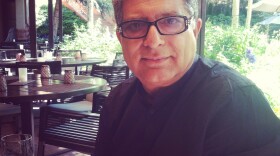Learning how to meditate can be difficult, and developing something called mindfulness can be just as tricky. Now a Carbondale couple aim to make those activities a little easier to achieve.
Carbondale resident John Bruna has seen and experienced a lot. He’s been homeless, worked as a corporate manager, trained to be a buddhist monk, all among many other things. Now Bruna and his wife, Laura Bartels, are creating an online community for people interested in mindfulness.
“There’s no agreed-upon definition of mindfulness that’s universal,” says Bruna. “But one version of it is the ability to bear in mind who you are and what your values are.”
Bruna and Bartels are based at their Way of Compassion Dharma Center in Carbondale. This newer project is called the Mindful Life Program, with daily teachings and other resources posted online for subscribers.
“The basic research right now says that on average, mostly in the U.S., our mind is wandering about half the time that we’re awake,” says Bruna.
He and Bartels have taught mindfulness courses for a while, usually traveling outside the Roaring Fork Valley, to help participants make better choices, avoid bad habits and generally stick to what students find important in life.
Bartels, who has made a name for herself as a straw bale construction expert, says she and Bruna noticed their courses didn’t seem to be enough. “We also wanted to be able to support people on a daily basis,” she explains, “because when you have daily support, and you feel connected to a community of support, that’s where you can really change habits.”
That can be especially true for folks in addiction recovery. A woman we’ll call Aaron is a member of the Mindful Life Program and says it’s been helping her in the early stages of putting her life back together. She heard about the project--and daily emails-- from Bruna.
“I use [the project] all the time,” she said by phone last week. “I watched all the videos that [John Bruna] and Laura [Bartels] did. And when I wake up, that’s the first thing I read in the morning, is the email. So yeah, I use it a lot.”
“Part of the vision is to always make this accessible to people,” says Bruna. He points out that the people who usually have time for mindfulness courses have a fair amount of disposable income, too. “We really wanted to take it out of the domain of the wealthy, educated, upper middle class community.”
Bruna and Bartels are up against a plethora of meditation and mindfulness phone apps. So far they have more than two hundred paying subscribers, and hope to sign up tens of thousands in the coming years.





